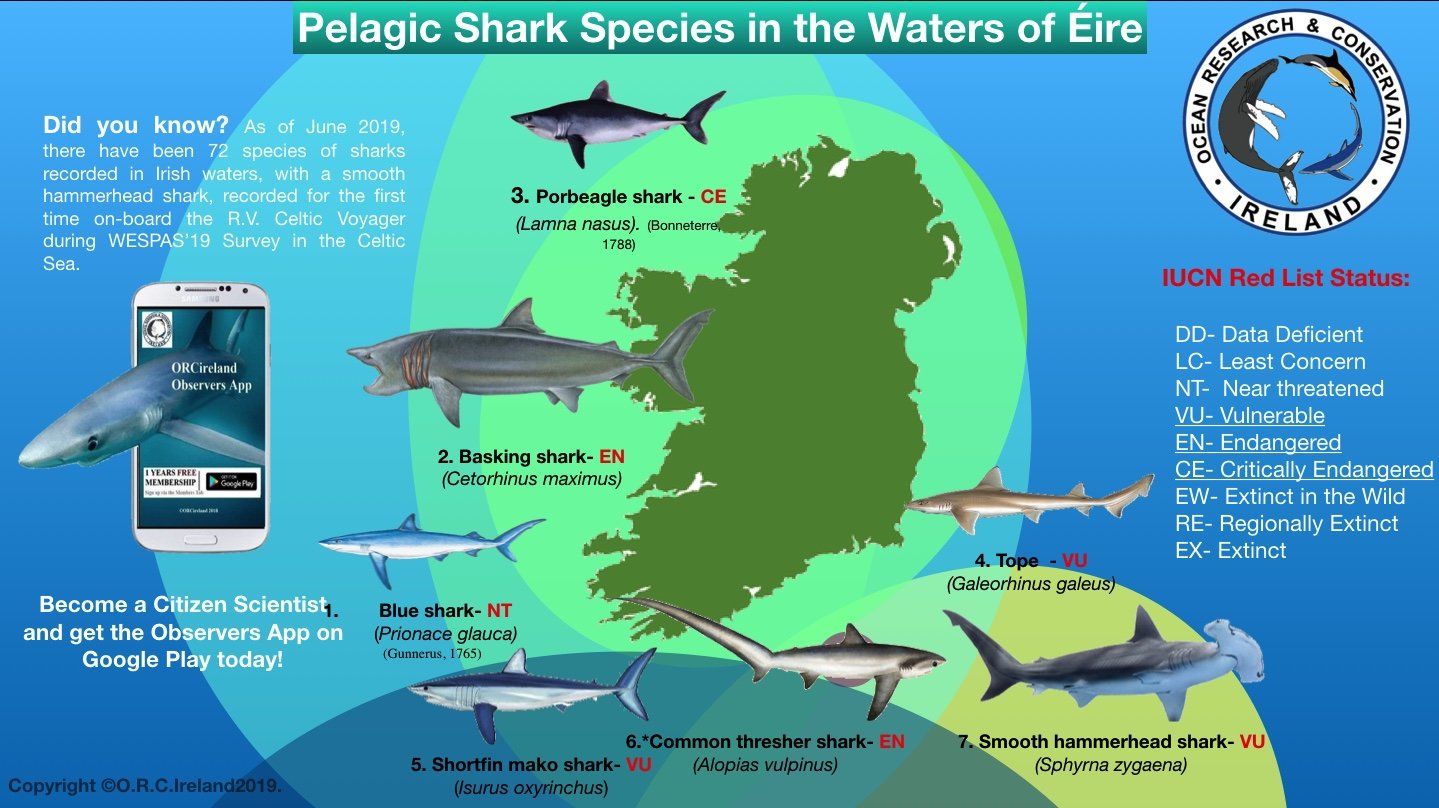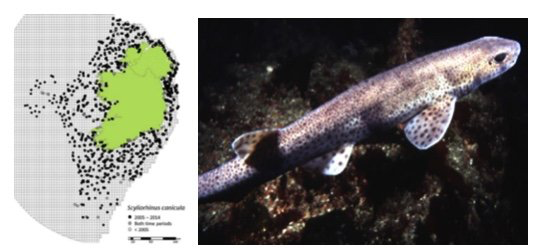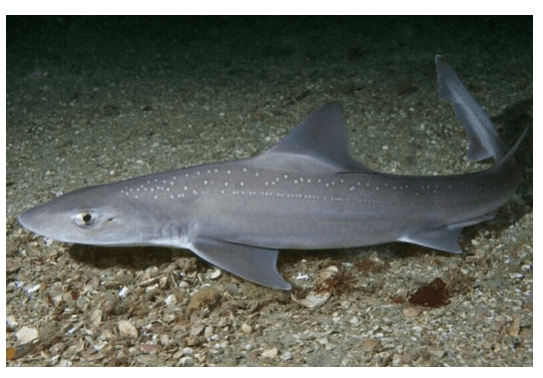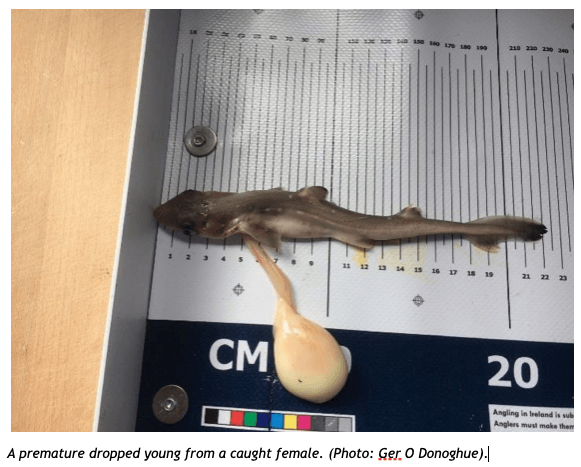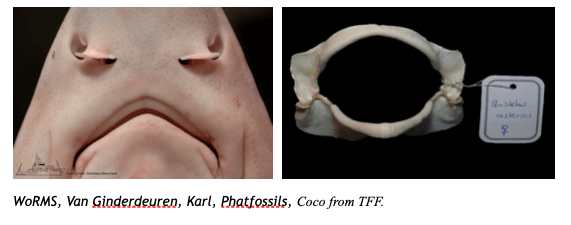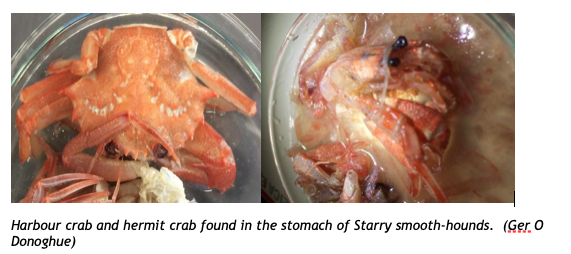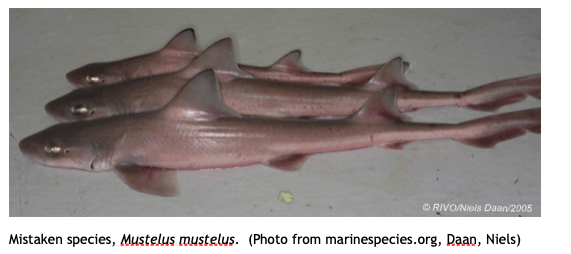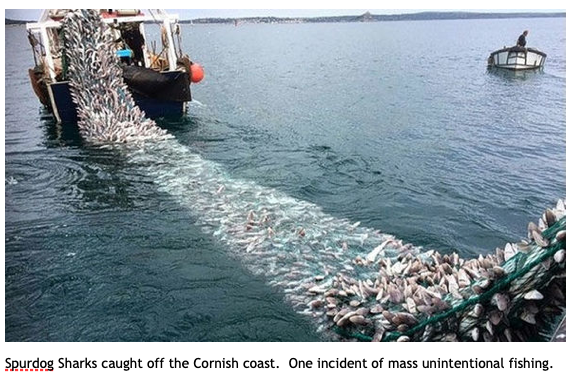Diversity of Sharks Must be Protected to Maintain Marine Ecosystem Balance!
When people think of Ireland, they don't often associate it with sharks or the movie "Jaws". However, Ireland is home to a huge range of shark species, and as of now there has been 35 recorded species described here. This list would include a lot more if you were to go as far as adding their cousins the skates, rays and rabbit fish, bringing the species list to 72. Sharks are one of the most important ecological sources of predator-prey relations around the Irish coast. Sharks help balance and maintain a healthy marine ecosystem.
These important predator-prey relationships go from the second largest shark in the world, Basking shark ( Cetorhinus maximus ), which can reach 5-7 meters, (although specimens have been recorded at 11 m) and feed on the smallest marine organisms, i.e. zooplankton, small fish, and invertebrates, to the smallest sharks that occur in our waters - the Blackmouth Catshark ( Galeus melastomus ) (Read about the black mouth nursery grounds just found off the west coast of Ireland in 2018 here) and the more commonly seen species the lesser spotted dogfish ( Scyliorhinus canicula ) both of which eat everything from ragworm to fish (Figure 1).
Fig. 1. Basking Shark (Cetorhinchus maximus), Blackmouth catshark (Galeus melastomus), Lesser spotted dogfish (Scyliorhinus canicula).
Another species which is little known about but is prevalent around Ireland is the starry smoothhound ( Mustelus asterias ), Cloquet, 1821).
Starry smooth-hound is a hound shark which belongs to the family Triakidae. This is very common species off the Irish coast particularly on the east coast between Ireland and Britain and can be found up estuaries occasionally during summer months ( Quigley 2016 , Brevé et al., 2016 ) but usually from June to October . This species is of least concern (LC) on the IUCN list and is found on the continental shelves of the northeast Atlantic, Norway, Ireland, Scotland, southwards to Algeria, Morocco, and Western Sahara.
Fig. 2 Starry smooth hound (Mustelus asterias). Pintrest.
The smooth-hounds are a demersal species found in waters from 1 meter to a depth of 200 m. It attains a maximum length of 140-150 cm and matures at a length of approximately 80-85 cm (Fischer et al . 1987). This species is viviparous and produces 7-15 pups per litter after a 12-month gestation period. The young feed on the yolk sac that is attached (Compagno et al . 2005). The Size at birth is approximately 30 cm total length (TL).
This shark is a demersal feeder keeping close to the bottom feeding on crustaceans (crabs, hermit crabs, lobsters and slipper lobsters) and some fish species. The jaws are comprised of crushing top and crushing bottom teeth well suited for the hard-outer shell off crustacean species (See below).
The starry smooth-hound is a species that listed as Least Concern, however is also data deficient and like many shark species in Irish waters, faces threats from overfishing, by catch, or being targeted for the European market. The main ships targeting smooth-hounds are French, UK and Spanish vessels. The catch data between 2005 and 2014 shows an average of 3000 Tonnes per year for their catch. The meat is sold as ‘dogfish’, given the current restrictions on spurdog as of 2016. Unfortunately, the starry smooth-hound has a near identical species called the Common smooth-hound ( Mustelus mustelus), and it can be easily misidentified. This is also an issue when the hound sharks are caught, they are put into one category and not specified by the species.
This means an unknown number of sharks are caught thought to caught mistaken for the wrong species .
© Ocean Research & Conservation Ireland (ORCireland) and www.orcireland.ie , est. 2017. If you like our blogs on the latest news in marine science and would like to support our work, visit www.orcireland.ie to become a member, to volunteer or to make a donation today.
References:
- Brevé, N. W. P., Winter, H. V., Van Overzee, H. M. J., Farrell, E. D., & Walker, P. A. (2016). Seasonal migration of the starry smooth-hound shark Mustelus asterias as revealed from tag-recapture data of an angler-led tagging programme. Journal of Fish Biology, 1–20.
- Clarke, M., Farrell, E.D., Roche, W., Murray, T.E., Foster, S. and Marnell, F. (2016) Ireland Red List No. 11: Cartilaginous fish [sharks, skates, rays and chimaeras]. National Parks and Wildlife Service, Department of Arts, Heritage, Regional, Rural and Gaeltacht Affairs. Dublin, Ireland.
- ICES. (2017). Report of the Working Group on Elasmobranchs, (31 May-7 June), 1018.
- Quigley, D.T.G. (2016) Smooth-hound Shark ( Mustelus asterias Cloquet, 1819): live strandings in Irish and UK estuarine waters. Irish Naturalists’ Journal 35: 27-34.
- http://irish-trophy-fish.com/irish-record-fish/marine-species/smooth-hound-mustelus-asterias/
- https://www.irishtimes.com/news/environment/baby-sharks-rare-shark-nursery-found-off-west-coast-of-ireland-1.3690735
- http://www.marinespecies.org/aphia.php?p=image&tid=105821&pic=78899
- http://phatfossils.com/extant%20references/Mustelus%20asterias%20(Starry%20smooth-hound%20shark).php
- https://www.pinterest.ie/pin/559994534907085155/?autologin=true
- https://en.wikipedia.org/wiki/Starry_smooth-hound
- https://en.wikipedia.org/wiki/Basking_shark
SHARE THIS ARTICLE






